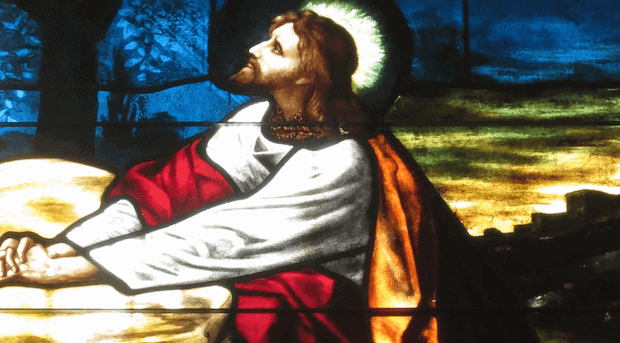In this post, excerpted from the March/April 2017 edition of Bible Study Magazine, John D. Barry discusses the prologue to the passion of Jesus—his anguish in the garden—by considering what the Gospels collectively say about it. By doing so, he offers a fuller picture of just one of the events leading up to the Bible’s darkest moment that concluded with the greatest hope.
***
Shortly after the Last Supper, we find Jesus praying. In his actions, we see what we should be—people who pray through our pain and love the will of God. Yet in the failures of Jesus’ disciples, we see ourselves as we often are.
The narratives of Matthew, Mark, and Luke—the Synoptic Gospels—unify around the account of Jesus’ anguish in the garden, as he experiences the full emotional burden of suffering for our sins (cf. Isa 52:13–53:12).
Struggling to follow Jesus
The Synoptic Gospels do not differ much in their depictions of this scene.
In the Greek text, the variations between Matthew and Mark are primarily vocabulary differences.1 In Luke, though, Jesus’ statements are shorter, revealing less about his grief (cf. Matt 26:38; Mark 14:34). While Matthew and Mark describe Jesus going back and forth three times between praying privately and rousting the disciples, Luke’s narrative structure is simpler, with just one exchange.
In Matthew and Mark (but not in Luke), Jesus selects Peter, James, and John to be near him while he prays—closer than the other disciples. Jesus specifically asks them to stay awake. This is a fight for their very souls; the question is whether they will stand by their rabbi when persecution, suffering, and death come.
Jesus had warned them about this day: “If anyone wants to come after me, let him deny himself and take up his cross and follow me” (Mark 8:34). There is deep irony here; just before this warning, Peter declares Jesus to be the Messiah (Mark 8:29). It is also Peter, James, and John who experience the transfiguration of Jesus (Matt 17:1; Mark 9:2; Luke 9:28). But Peter ultimately will betray Jesus, and James will flee; it seems that John alone among the apostles remains at the cross (Mark 14:50, 66–72; John 19:26–27).
Persevering in the Father’s will
In all three Synoptic Gospels, Jesus asks that his coming suffering be taken away, if at all possible, but states that it should not be his will but God the Father’s that is done (cf. John 12:27). Jesus shows that it is not a valiant spirit God desires but a willing one. Feeling sorrowful is expected, but denying God’s will because of our emotional struggle is not an option (cf. Isa 53:3, 10). We can see this as a moment of temptation for Jesus, but he does not give in.1
It certainly was a time of temptation for the 11 disciples who were with him. The Synoptic Gospels record them struggling to stay awake and Jesus rebuking them, urging them to be alert lest they fall into temptation. Matthew and Mark include Jesus’ often-quoted remark: “The spirit is willing, but the flesh is weak” (Matt 26:41; Mark 14:38). The disciples should have been praying, but instead, they fall asleep.2
The same thing happens in our own lives: we desire God’s will, but when it comes time to pursue him deeply and pray earnestly, we succumb to other distractions. Our spirit is willing, but our flesh is weak. At the outset of the passion narrative, the Gospels emphasize trust and obedience in the Father. These passages reveal the heart of Jesus and the calling of all who would follow him—to stand faithfully in prayer and lean into the will of God.
***
This article was originally published in the March/April 2017 edition of Bible Study Magazine.
Scripture quotations are from the Lexham English Bible (LEB).
John D. Barry is the CEO and founder of Jesus’ Economy, a nonprofit dedicated to creating jobs and churches in the developing world. John also is the general editor of Faithlife Study Bible and a former editor-in-chief of Bible Study Magazine.
- While much has been made of Jesus calling out “Abba Father” in Mark’s Gospel, “Abba” likely transliterates the Aramaic words Jesus spoke (Mark 14:36) and parallels Matthew’s “My Father” (Matt 26:39). Both expressions show Jesus’ intimate relationship with God the Father. In Mark, Jesus also says that all is possible for God (Mark 14:36); this line doesn’t appear in Matthew.
- In Luke’s Gospel, the disciples are specifically told to pray (Luke 22:40); in Matthew and Mark, the disciples are simply told to wait while Jesus prays (Matt 26:36; Mark 14:32).







